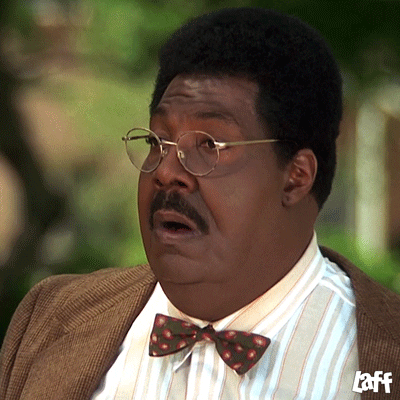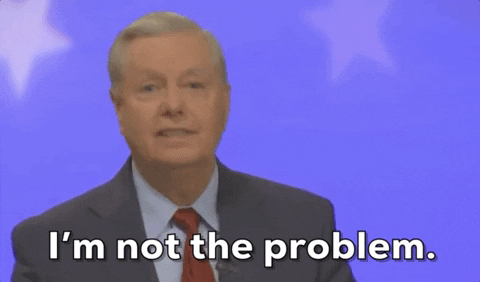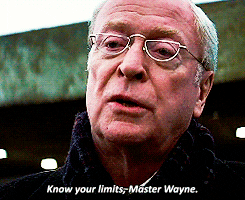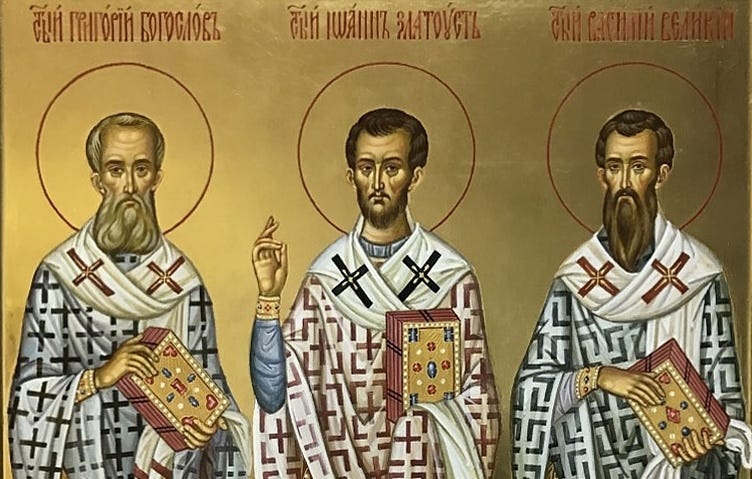Is the Orthodox Church Growing?
The modern influencer economy, "number go up," and a balloon ready to pop.
The easiest way to solve a problem is to deny it exists.
-Issac Asimov

I come across relatively few balloons as an adult. Which is unfortunate, because they’re quite fun.
You see, I was playing with my nieces recently. They had a pack of balloons—just your standard, cheap, multicolor ones—and wanted me to blow up a few. I did, and we took turns batting and kicking them around the room.
A good time was had by all.
Being a rather stereotypical uncle, I’d occasionally bat the balloons right at my nieces’ faces. They’d shriek as the giant spheres zoomed at them, and then laugh as they harmlessly bounced away.
Because balloons, even when quite large, are basically harmless. They’re just a bit of rubber stretched thin around hot air. They can smack you square in the face, yet you’ll barely feel a thing.
They’re feather light, all but unsubstantial. And it doesn’t take much to make them pop…
So why am I writing about balloons?
Well, because they remind me of the “growth” some argue we’re seeing in the Orthodox Church.
Now, many people take it as a given that the internet is fueling Church growth across the United States.
You, dear reader, might take it as a given…
But I disagree.
“Now Steve,” you may protest, “it’s common knowledge that we’re seeing a significant uptick in internet-generated interest in Orthodoxy. Some parishes are full of new converts! And I’m sure you’ve seen this firsthand, since you’ve visited hundreds of parishes over the years.”
“Plus,” you may continue, “it’s weird to see you sour on the internet as a tool for catechesis and outreach. You spent a decade creating internet content (content which many parishes and families still use, by the way). Your work is a part of this growth!”
Those are fair points, dear reader.
And I concede that something is growing.
But my experience over the past decade is precisely what’s led me to this conclusion: that the “growth” of Orthodoxy is akin to a child’s balloon—big and shiny but ultimately unsubstantial, full of hot hair.
And dangerously close to popping.
I know, dear reader, that’s a big claim. In fact, it’s one I’ve been wrestling with for a long time: I’ve been editing and restarting this piece for months.
And what it amounts to isn’t simply a critique of contemporary online outreach and the modern influencer economy: it’s one that questions the very sense of self we’ve developed as the Church in the postmodern world—a Body of believers firmly entrenched in our Secular3 Age of Authenticity.
So, if you’re open to the possibility that we, as the Church, have a big problem which we haven’t fully comprehended yet, I invite you to read on.
And we’ll start by backing up a bit, because my fears about the internet aren’t exactly new.
In fact, you may even agree with some of them (at least somewhat).
Which is actually part of the problem…
Shared Critiques of Internet “Orthodoxy”
The concerns I’ve expressed about the internet’s impact on the Church are nothing new: see the final three episodes of “Be the Bee,” for example, and an article I wrote for this Substack earlier this year.
I’ve been thinking and sharing about this stuff for a while.
(Not to mention episode 157 of Be the Bee, an even earlier episode where we discussed the need to fast from social media and our digital devices.)
My three basic concerns, to state them as succinctly as possible, are that the internet:
appeals to our baser passions (even at its best),
reinforces the hyper-individuality of our Secular3 world, and
transgresses even the most basic canonical boundaries.
And that’s all well and good…
Because nobody really disagrees with any of these points.
I’d be surprised if you did, dear reader.
In fact, one particularly notorious Orthodox influencer messaged me to say he agreed with my Substack piece.
But that theoretical agreement doesn’t mean much.
Because he—like far too many others—continues to feed the content machine of contemporary, internet “Orthodoxy.”
Why?
Well, I think it’s because people interpret the three points above as risks that, somehow, don’t apply to them.
But they do.
And this is the reality that I don’t think we’re prepared to deal with as a Church.
So let me explain by getting personal…
“But I’m Not Part of the Problem”
It’s me. Hi. I’m the problem, it’s me.
-Taylor Swift
Just as most people are (at least secretly) Swifties, most people agree with my critiques of the internet.
But people also don’t see themselves—or the media they enjoy consuming—as being indicted by the critiques I expressed.
They don’t see themselves—or their content preferences—as part of the problem.
Because, for every one of the three points I listed above, there’s a ready-made response:
I agree that the internet appeals to our baser passions, but I’m producing/consuming content that appeals to something higher.
I agree that the internet reinforces the hyper-individuality of our Secular3 world, but I’m building/part of a community of believers who are moving beyond the secularity of the wider culture.
I get that the internet transgresses even the most basic canonical boundaries, but I have a blessing to do this work.
Now, I’m not interested in having a conversation with every Orthodox content creator or content consumer about their favorite media. A lot of people have a lot of effort wrapped up in their identities as content creators, and a lot of pride wrapped up in the feeling that they’re helping the Church.
(Maybe even in the feeling that they’re modern-day evangelists and apostles.)
I’m not interested in throwing stones or picking fights. So I’m not going to make this piece about anyone else. Instead, I’m just going to critique myself.
And why not?
I mean, I’m both a former content creator and former content consumer. I quit making Orthodox content back in 2022 and stopped consuming Orthodox content well before that.
(How this Substack fits in with that decision, if at all, is something I’ll get to in a bit.)
In fact, I’m a former content creator who’s still primarily known for that content. And every time I visit a parish for a meeting or speaking engagement, people continue to thank me for that work.
Both laity and clergy—whether deacons, presbyters, or bishops—continue to tell me that, at Y2AM, we made good content that led to real growth, both for people who grew up in the Church and for those who discovered the Church through our work.
And that’s why, as I bask in this affirmation and praise, I want to tell myself that, whatever issues the internet may have, I wasn’t part of the problem.
I want to tell myself that I was part of the solution.
But that’s a lie.
Because, the truth is—a truth I hope to help you understand—I was part of the problem.
And whatever good may have come from our work, I ultimately concluded that any good it was marred by a fundamental misunderstanding of the Church.
In other words, I’m not trying to differentiate between “good” and “bad” content.
Instead, I’m arguing that the content culture we’ve created is at odds with the Church’s sacred order.
And-looking at myself first of all—it boils down to one simple truth…
I am Not an Ecumenical Teacher
The medium is the message.
-Marshall McLuhan
Remember the three basic critiques of Orthodox content we listed earlier in this piece, that the internet:
appeals to our baser passions (even at its best),
reinforces the hyper-individuality of our Secular3 world, and
transgresses even the most basic canonical boundaries.
This is a content-neutral analysis, so I’m not going to defend our work against the first and second points.
But I can’t deny the third point.
And it boils down to a simple proposition (one that we, drunk on an abundance, will find hard to swallow):
There simply can be no blessing to preach and teach universally, without regard to canonical boundaries, as one does on the internet.
So what does the blessing to preach and teach actually look like in practice?
I’m glad you asked, dear reader!
About a month ago, I was in Nashville to lead a retreat at a parish in the Antiochian Archdiocese. I was only there by invitation: I have no business speaking to a congregation just because I think I have something true or important to say.
That Sunday, I offered the sermon during the Divine Liturgy. Again, I did so only by invitation and with the blessing of the presbyter who bears responsibility for that eucharistic community (serving, as he does, with his bishop’s blessing).
And that’s because (I’ll say it again to be absolutely clear) I have no business speaking to a congregation just because I think I have something true or important to say.
I was in a similar situation in Pittsburgh a few weeks ago, when I offered a retreat for both clergy and laity of the OCA’s Diocese of Pittsburgh and Western Pennsylvania. Once again, I was only there by invitation: I have no business speaking to a congregation just because I think I have something true or important to say.
Do you see what I’m getting at?
The Church, as I’ve noted before, is local and eucharistic. The fullness of the Church is found in the bishop surrounded by his clergy and laity. And it’s the bishop who has ultimate authority to preach to those in his diocese: no other person, not even another bishop, gets to walk into this diocese and start preaching or teaching.
Which is why I had to receive a blessing to preach when I was in Nashville (not just from anyone, but from those with canonical authority over the parish where I spoke).
It’s why I had to receive a blessing to preach when I was in Pittsburgh (again, not just from anyone, but from those with canonical authority over the diocese where I spoke).
So let’s say I want to set up a YouTube channel to teach and preach to people, not just in Nashville and Pittsburgh, but anywhere in the world.
Who can give me a blessing to do that?
That raises an important question, one we’re too happy to sidestep:
Can anyone give you the blessing to teach on the internet?
The Canonical Limits of Teaching Authority
The whole problem with the world is that fools and fanatics are always so certain of themselves, and wiser people so full of doubts.
-Bertrand Russell
If we took the ecclesiology of the Church seriously, we’d know the answer to my question is “no one.” There are no universal authorities in the Church, and there is no one who can grant someone the ability to preach and teach anywhere in the world.
(That’s why, for example, there is no universally recognized catechism in the Church. No living person has universal teaching authority, so there’s no one to either draft or bless such a project. This is simply a consequence of Orthodox Christian ecclesiology, which views the Church as both local and eucharistic.)
And I say this as someone who did have a rather broad mandate to preach and teach. I spent almost a decade as the Director of Youth & Young Adult Ministries for the Greek Orthodox Archdiocese of America.
Yet, as the employee of a particular Archdiocese, my mandate was confined to canonical boundaries: by virtue of my position, I had no inherent authority to preach or teach outside of GOARCH (ie, to other parishes across America; to Antiochian parishes in Nashville or OCA parishes in Pittsburgh, for example, or to parishes outside of the United State).
That’s why questions about whether or not a person has a “blessing” to, for example, start a podcast are silly. Your parish presbyter has no authority to let you preach anywhere outside that parish. And your bishop has no authority to let you preach anywhere outside his diocese.
It’s maddening that I have to hammer this point, but alas:
No hierarch—and certainly no presbyter—can bless someone to preach anywhere and everywhere.
(Especially if the presbyter in question isn’t my parish presbyter, or the bishop in question isn’t my diocesan bishop. We don’t believe in ecclesial magic, as if anyone with a long beard and vestments can simply invest me with limitless authority to preach and teach.)
We understand this (maybe?) when it comes to analog spaces. But, on the internet, we operate under the assumption that receiving a thumbs up from any cleric—whether bishop or presbyter—immediately confers the authority to say anything anywhere.
And it’s absurd.
It’s the digital equivalent of saying I can walk into any parish, grab the microphone, and offer an unsolicited sermon because a cleric who has no connection with that parish or community said I could.
And this is why I remain happily retired from content creation.
After all, my entire career rested on a deep misunderstanding of basic ecclesiology.
A misunderstand that we all seem to collectively share in our contemporary age (more on that below).
Now, if you’re clever, you might spot a loophole here…
“Sure,” you may concede, “no one can preach to parishes under a canonical bishop. But the internet isn’t about preaching to people who are already Orthodox Christians: it’s about preaching to those outside the Church in hopes of bringing them in.”
Now, I know you wouldn’t make such a transparently disingenuous argument, dear reader. Because we both know that online Orthodox content is consumed by a ton of people in the Church.
But the underlying question is worth addressing…
What About Preaching to Non-Orthodox?
I have always something to repent for after having talked, but have never been sorry for having been silent.
-Saint Arsenios
At the end of a service, you’ll normally hear a long list of saints that the presbyter invokes. Among those saints, you’ll hear prayers to “our fathers among the saints, the great hierarchs and ecumenical teachers Basil the Great, Gregory the Theologian, and John Chrysostom.”
(Ecumenical here means that these saints were teachers for all people throughout the world, not just the cities where they reigned as bishops of the Church. In fact, their words continued to be studied across the Church centuries after they were recognized as having this universal teaching authority.)
But it’s not just these three: if you read the Synodikon of Orthodoxy (drafted by a Synod convened in 843 to confirm the veneration of icons), you’ll find a long list of saints who are held up as being reliable teachers, not just in a particular diocese, but throughout the world…
[A]s is in accordance with Divine Scripture, and its interpreters the theologians, that is, Athanasios, Basil, Gregory, and John [Chrysostom], and Cyril, and together with them, the wise Maximus, and the divinely eloquent [John] Damascene, and moreover all the fathers and teachers of the Church of Christ; to this Gregory [Palamas]1, who was manifest by his words and deeds to be the fellow-communicate, companion, ally, emulator and comrade in arms with all these saints, Eternal Memory!
The list of saints is, of course, not comprehensive. It wasn’t complete when it was drafted in the 9th century and, in fact, it was edited in time—as noted in a footnote above, Saint Gregory Palamas was added to the document after his repose in the 14th century (almost 500 years after its initial drafting).
But Saint Gregory Palamas isn’t the only father and teacher the Church has received since the Synodikon was first published. While the document itself hasn’t been updated since the 14th century, we can point to many fathers and teachers since that time, even down to our own day.
(This even includes twentieth century saints like Porphyrios the Kafsokalyvite, Nikolai Velimirovich, Silouan the Athonite, and Sophrony of Essex, who are widely read and studied. And I’m sure we’ll add twenty-first century saints to this list in due time.)
So yes, there are certain figures in Church history who are acknowledged as fathers and ecumenical teachers in that they offer instruction and benefit to all people everywhere.
But does this contradict the point I made earlier, about the Church being local and eucharistic?
Well, no, because all of these ecumenical teachers have an important thing in common:
They didn’t present themselves as ecumenical teachers.
When Saint Basil was the bishop of Cappadocia, for example, he had no authority to walk into another diocese and preach or teach. He would have never walked into Thessaloniki or Antioch and acted like he was the ruling bishop there.
Because his ministry was in a particular place and to a particular flock.
It was only later, after his repose and recognition as a saint, that the Church recognized him as a father and teacher of all.
But, in our contemporary influencer economy, we’ve become accustomed to people claiming an ecumenical mantle for themselves. We’ve become accustomed to people operating within the boundaries they set for themselves, rather than the canonical boundaries set by the Church (which is a particularly serious issue in the United States, where our canonical boundaries are a complete mess).
And we’ve become accustomed to people cultivating a platform for themselves, completely disconnected from holiness or communion with God.
And that shouldn’t surprise us, since we find ourselves in a Secular3 “Age of Authenticity” that isn’t particularly concerned with God’s action in the world…
The Internet and Secular3 Shortcuts
The whole problem with the world is that fools and fanatics are always so certain of themselves, and wiser people so full of doubts.
-Bertrand Russell
Recall that, at the start of this piece, I suggested that a child’s balloon is a good image to represent the “growth” of contemporary Orthodoxy: it’s a shiny mass that’s ultimately unsubstantial, full of nothing but hot air.
The Church is the Body of Christ. The Life in Christ is one spent in reckless pursuit of Christ, knowing the Lord not just academically or theoretically but intimately. And, when the Church has grown in the past, it has been thanks to the witness of the saints: of people who spent a lifetime in repentance and growing in real knowledge of the Living God.
One of the hallmarks of our Secular3 world is that the self is viewed as “buffered” from outside forces. Caught in the cross-pressure between faith and doubt, we no longer tremble before unseen forces. Instead, we see the self as somehow buffered or insulated, free to navigate the world in pursuit of its own self-actualization.
And that self-actualization might just take the shape of becoming a self-professed Orthodox influencer and ecumenical teacher.
Receiving a good word, our first instinct is not to retreat into silence, to dedicate ourselves to a lifetime of ascetic labor and repentance. We’re not interested in taking the time to develop a dogmatic consciousness where the Spirit of God takes hold of our hearts and begins to pray in and through us.
Instead, we start a podcast.
There is wisdom behind the Church’s local and eucharistic structure. The canonical boundaries of the Church help ensure that the voices which proclaim the Gospel are not self-directed voices in search of their own self-actualization.
A man is ordained to the episcopacy after a certain level of preparation and vetting, for example—at least theoretically. And it’s his responsibility, as the father of a particular diocese, to “rightly divide the word of truth.”
Yet, even when ambitious and avaricious men sneak through and bypass that vetting, the damage they do is localized.
But the contemporary influencer economy isn’t concerned with locality or eucharistic grounding. A man can gain an international following with people who don’t really know him and can’t hold him accountable in a real community: his status as a “teacher,” in other words, is connected to the content he offers rather than to his own holiness or worth.
For the first time in Church history, “growth” is being attributed, not to the witness of the saints, not to the grace-filled words of holy people transformed in Christ, but to the ability of people to attract attention on platforms that are designed to spread the vile and vainglorious.
People who have (whether they care to admit it or not) anointed themselves ecumenical teachers.
People who have claimed that status because of their clever ability to attract attention, rather than after a lifetime lived in communion with the Living God.
Internet “Orthodoxy” is a place of impatience and shortcuts, where (illusory) short-term growth comes at the expense of long-term transformation in Christ.
Rather than reflecting an Orthodox Christian ecclesiology, our influencer economy is a weird mix of Catholic and Reformation ecclesiology where anybody can anoint himself (Reformation) a teacher with universal authority (Catholic).
Instead of operating within the established hierarchy of the Church (seeking employment by a diocese, seeking a position at an accredited seminary, etc), our influencer economy is a weird system where ones “Orthodoxy” is demonstrated by attracting attention to oneself rather than cultivating a spirit of peace.
And, instead of doing the hard work of funding seminaries, forming seminarians, seeding mission parishes, and so on, we can simply start a Twitter account or Discord group and point to the engagement as growth.
Is it local? No. Is it eucharistic? Who cares?
All that matters is that the number goes up.
(You may recognize that phrase from a recent analysis of the securities scam we call “cryptocurrency.” And yeah, the rise—and fall—of crypto and NFTs is a pretty good analog2 of the balloon which represents the para-ecclesial growth of contemporary “Orthodoxy.”)
Or, if you don’t like my image of the balloon—an insubstantial mass filled with hot air, dangerously close to popping—then perhaps you’d prefer the Lord’s warnings about illusory, short-term growth:
“Behold, a sower went out to sow… Some fell on stony places, where they did not have much earth; and they immediately sprang up because they had no depth of earth. But when the sun was up they were scorched, and because they had no root they withered away…” (Matthew 13:3, 5-6)
Yet, even if I’m right and we need to radically change the way we see the internet’s relationship to preaching and teaching, that raises a question…
Is there Room for any Orthodox Content?
My contention is that the sort of preaching which belongs to the bishops and their appointees (presbyters, local lay leaders, etc) properly belongs in analog, real-world, local, eucharistic communities. That preaching would include things like catechesis, dogmatics, sermons, Bible study, etc.
(Yup, all things that I created and posted on the internet over the years.)
But I don’t think that a person needs a blessing to, for example, write a novel or produce a movie. While art certainly can communicate something that is true and beautiful, I’m not aware of any precedents from Church history or ecclesial reasons why an artist would need hierarchical license to engage in their craft.
So perhaps these are the two extremes of the spectrum: catechesis has no place apart from the local, eucharistic community; while art can be created freely, a natural activity of civil society.
(And yes, that statement assumes the presence of a liberal—in the classic, not partisan sense—democratic order where people enjoy the civic right to speak freely.)
Yet, even if the extremes are clear, there’s plenty of comment that exists somewhere in the middle.
So where do we draw the line?
This is where this piece lands with a disappointing plop rather than a satisfying bang because, to be honest, I’m not sure…
Looking back on my career, I’m most uncomfortable with things like Be the Bee and Live the Word, which presented basic catechesis and Biblical interpretation (not to mention all the sermons I vainly posted on YouTube). That people and organizations continue to share them directly to the internet, where anyone can watch them without any larger context and absent a eucharistic community, deeply concerns me.
On the other hand, a series like Pop Culture Coffee Hour didn’t directly provide catechesis and also didn’t offer any new artistic creations. Yet, the series explored popular movies and TV shows in the Light of Christ. So where does that fall in the spectrum?
But perhaps this analysis needs more than one axis. Because, even while I’m not too happy about things like Be the Bee simply living in the digital void, I know that many communities continue to use those videos in parish Bible studies and catechism classes. When hierarchs and presbyters present these resources to the faithful in their care, my concern vanishes.
So maybe, dear reader, as we wrestle with this question, we need to consider two axes:
the spectrum between catechetical materials (which, ecclesial, shouldn’t exist as “content”) and artistic materials (which requires no blessing to create); and
the spectrum between somebody finding materials for their own, self-directed consumption (which is troubling) and the vetting and prescription of materials by local ecclesial leaders who endorse them as part of a parish or diocesan ministry (which is the ecclesial leader’s prerogative).3
Where does this Substack fit, in that analysis?
Again, I’m not sure.
The purpose of this ongoing project isn’t to preach or teach, but rather to explore the ways that the Orthodox Church operates in—and is shaped by—our Secular Age.
Is cultural analysis and critique ok? Is it relevant that I have a formal theological education and a lot of experience working in and with ecclesial structures? Or should I end this project, too?
Again, I’m not sure.
And I know that’s not a satisfying way to end this piece…
So What Now?
Honestly, I don’t know.
But I hope this post posed a question that’s worth considering.
I hope we stop to think deeply and seriously about what (and who) we are.
Are we people in communion with the Lord, people who are being formed into the measure of the stature of the fullness of Christ, people who are developing the mind of Christ in local, eucharistic community?
Or are we trapped in the immanent frame, directing ourselves as we see fit?
Are we people who are shaping the culture?
Or are we being shaped by it?
Are we using new media to invite people into genuine encounter with the Lord?
Or are we being consumed by an extremely online, extremely self-directed and self-serving influencer culture that transforms everything it touches?
The Orthodox Church is growing, many will say. But is it really, dear reader?
If it is (and I truly hope it is), I don’t think expansion of the influencer economy is a good sign.
But who, knows? Maybe I’m wrong.
I suppose we won’t know for sure until the balloon finally pops.
You might wonder how the Synodikon of Orthodoxy (which was drafted in 843) could mention Saint Gregory Palamas (who reposed in 1359). The heresies of Barlaam and Akindynos were added after the Ninth Ecumenical Council in 1351, and Saint Gregory himself was added to the list of ecumenical teachers after his death.
So is the rise and fall of Mars Hill (as described in the eponymous podcast), if you prefer the story of a church governed by this “number go up” ethos.
Now, dear reader, you may ask how theological texts fit into this analysis—not the writings of recognized ecumenical teachers, but rather modern writers who have yet to receive such acclaim. A random person self-publishing their own theological musings seems just as inappropriate as a random person preaching and teaching on their YouTube channel. But what if a recognized seminary publishes a theological text?









Thank you for this thoughtful article. The implications of your insights could be significant if people truly heed the wise cautions you raise. When I became Orthodox in 2010, after serving 19 years as a Protestant pastor, I encountered many people who assumed that I should quickly become a priest, and also use technology to develop internet content. I didn't have many people encouraging me to be quiet and still, but I knew that was what I needed most. My parish priest allowed and encouraged this. When I once told another mentor and friend, Fr Tom Hopko, that "I just want to be an Orthodox Christian. It's enough. I don't aspire to a 'career change'" - he affirmed and encouraged me. I had spent 19 years developing content - words, words, words, and I needed to not just become Orthodox formally, but learn to be still and quiet (truly Orthodox inwardly). During the last 14 years, I've also grown more and more concerned about how technology is shaping us (not merely content, but the medium itself). I am so appreciative of your honest writing, and I'm grateful for your humility in this journey.
Ha! I just typed a really long comment and then the page refreshed and it disappeared.
We can’t just silence people. People write about what they love and sometimes that is their faith. They don’t need to be perfect. We don’t need to get riled up because of their actions. We need to pursue our own repentance.
My recently started journey of writing publicly about Orthodoxy has been very good for me. I’ve been wrestling deeply with things, come face to face with my own misconceptions about the faith, become more aware and curious, and exercised the divine gift of creativity that is given to me. I’m not fooling myself into thinking that I’m saving anyone. I’m just living, publicly, same as people have always done.
Thankful for you Steve and everything you’ve taught me over the years!